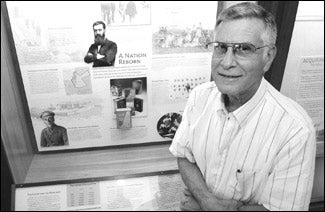LOS ANGELES, Nov. 14 (JTA) — A museum honoring American and Canadian volunteers who fought for Israel’s independence will open at the University of Florida. The central exhibit of the Aliyah Bet and Machal Museum, to be dedicated Nov. 20, commemorates the deeds of two groups of volunteers. Some 240 North Americans manned rickety ships to run the British blockade to bring Holocaust survivors and refugees to Palestine between 1946 and 1948 in the clandestine operation named Aliyah Bet. Among the 12 ships was the famed Exodus 1947. Another 1,000 American and Canadian men and women made their way to the nascent Jewish state to serve in the air force, navy and army in Israel’s War of Independence. They were designated as Machal, the Hebrew acronym for Volunteers from Abroad — or, more informally, Anglo-Saxim. Most of the volunteers were World War II veterans. The combat-seasoned fighter pilots, in particular, formed the backbone of the fledgling Israeli air force. In addition to the North Americans, some 2,500 volunteers from 40 countries served in Machal. Early next year, a West Coast replica of the Florida exhibit will be installed at the University of Judaism in Los Angeles. The value of the volunteers’ contributions was expressed by former Prime Minister Yitzhak Rabin in words engraved in the Machal Memorial at the entrance to Jerusalem: “They came to us when we needed them most, during those hard and uncertain days of the War of Independence.” Alongside it is another inscription, from the Book of Joshua: “All those of valor shall pass armed among your brethren, and shall help them.” The central display in the new Hillel building of the University of Florida consists of cabinets framing seven large and seven small panels. In documents, graphics and text, the exhibit documents the history of Zionism and American support, arms acquisitions and recruitment of volunteers, Aliyah Bet and navy service, and Machal volunteers in the Israel Defense Forces. The final panel commemorates 40 North Americans killed in action for Israel, among them Col. David “Mickey” Marcus and seven Christian volunteers. The Los Angeles exhibit, organized by Dr. Jason Fenton, will add an eighth panel on the contributions of some 400-500 volunteers from the West Coast, and those who illegally provided Israel with desperately needed arms and aircraft. Some 100 surviving Aliyah Bet and Machal veterans and their families are expected at the dedication weekend at the Hillel building. The main speakers will be Yitschak Ben Gad, Israel’s consul general in Miami, and Ira Feinberg, president of the American Veterans of Israel, the organization that sponsored the $100,000 project. They will be joined by Ralph Lowenstein, dean emeritus of the College of Journalism and Communication on the Florida campus and director of the new museum. Lowenstein was chief catalyst in the creation of the museum and also established the Aliyah Bet and Machal Archives at the University of Florida. An award-winning reporter and author, he fought with an armored unit in Israel as an 18-year old volunteer, and later served in the U.S. Army during the Korean War. “The North American Jewish communities made important contributions to the establishment of the Jewish state,” Lowenstein said. “The more than 1,200 Aliyah Bet and Machal volunteers played a crucial role in assuring Israel’s victory in the War of Independence. “This story is not well known in America or Israel,” he said. “Now, with the establishment of the museums on both coasts, this story is being told.” One letter in the exhibit reflects the spirit of the volunteers. It’s from Ralph Moster, a 24-year old from Vancouver, who wrote to his mother in June 1948. “If anything should ever happen to me, I shall not be sorry that I have come to Eretz Israel,” he wrote. “I am grateful to you for having brought me into the world at a time that I have a chance to fight for a free land for the Jews.” Six months later, Moster was killed in action against the Arabs.

Help ensure Jewish news remains accessible to all. Your donation to the Jewish Telegraphic Agency powers the trusted journalism that has connected Jewish communities worldwide for more than 100 years. With your help, JTA can continue to deliver vital news and insights. Donate today.






